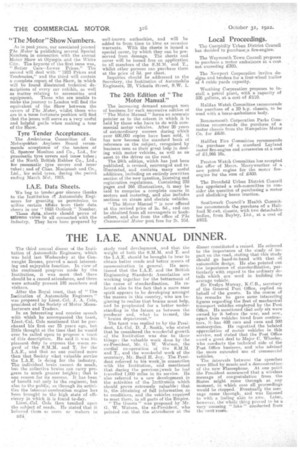THE I.A.E. ANNUAL DINNER.
Page 8

If you've noticed an error in this article please click here to report it so we can fix it.
The third annual dinner of the Institution of Automobile Engineers, which was held last Wednesday at the Connaught Rooms, proved a most interesting and enjoyable function. In view of the continued progress made by the Institution, it was meet that there should he a record attendance, and there were actually present 185 members and visitors.
After the Royal toast., that of "The Institution of Automobile Engineers " was proposed by Lieut.-COL J. A. Cole, president of the Society of Motor Manufacturers And Traders.
In an interesting and concise speech with which he accompanied the toast, Lieut.-Col. Cole mentioned that he purchased his first, car 25 years ago, but little thought at the time that he would ever be called upon to propose a toast of this description. He said it was his pleasant duty to express the warm regard of the S.M.M. and T. for the. I.A.E. and that no one realized more than that Society what valuable service the I.A.E. is doing for the industry. The individual brain cannot do much, but the collective brains can carry progress to much greater heights ; that is one reason for its success. It has been of benefit not only to the engineer, but also to the public, as through its activities the internal-combustion engine has been brought to the high state of efficiency in which it is found to-day. Lieut.-Col. Cole then touched upon the subject of roads, He stated that it believed them as users or makers to 132-1 study road development, and that the weight of both the S.M.M. and T. and the LA.F. should be brought to bear to obtain better roads and better means of commanication in general. Ile menHeeled that the I.A.E. and the British Engineering Standards Association are working together for the betterment of the cause of standardization. He referred also to the fact that a snore sane spirit appears to be developing amongst the masses in this country, who Are beginning to realize that brains must help, and he prophesied for a better understanding in the future as between the producer and, whit be termed, the " brains department."
The toast was replied to by the President, Lt.-Col_ D. J. Smith, who stated that he considered the wonderful growth of the Institution was due to three things : the valuable work done by the ex-President, Mr. G. W. Watson. the cordial co-operation of the S.M.M. and T., and the wonderful work of the secretary, Mr. Basil H. Joy. The President referred to his work in connection with the Institution, and mentioned that during the previousewe,ek he had travelled 1,000 miles in its service. Ile also referred to a new development in the activities of the Inetitution which should prove extremely valuable: that is, theobtaining of full inferrnation as to conditions, and the vehicles required to meet them, in all parts of the Empire. " The Guests " was proposed by Mr. 0. W. Watson, the ex-President, who pointed out that the attendance at the dinner constituted a record. He referred to the importance of the study of impact on the road, stating that this study should go hand-in-hand with that of automobile design. He also pointed out the importance of standardization, particularly with regard to the ordinary details which are used in building the average vehicle. Sir Evelyn Murray, X.C.B., secretary of the General Post Office, replied on behalf of the guests. In the course of Ins remarks he gave some interesting figures regarding the fleet of mechanical transport. vehicles employed by the Post Office. He mentioned that only six were owned by it, before the war, and now, apart from vehicles hired from contractors, it-has 400 cars and vans and 500 motorcycles. He regretted the belated appreciation of motor vehicles in this service, and stated that the Post Office owed a great deal to Major C. Wheeler, who conducts the technical side of the Post Office business, and who advised the more extended use of commercial vehicles.
The intervals between the speeches were filled by music and a demonstrationof the new Elemephone. At one point the President announced that a wireless message of congratulation from the States might come through at any moment, in which case all proceedings would be stopped. Eventually the message came through, and was listened to with a feeling akin to awe. Later, however, the whole thing proved to be a very 'emus* " fake " conducted from the next-rotate


































